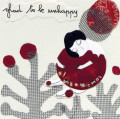Glad To Be Unhappy
- Liner notes -
THE SOUND OF DISTANCE
The names of these musicians should be quite familiar to those who follow Leo Records’ productions. The singer Stefano Luigi Mangia has released for this label the album “Painting On Wood (LR536), that sees him leading a quartet featuring the excellent Gianni Lenoci on piano, and the more recent “Ulysses” (LR627), conceived with Stefania Ladisa, Angelo Urso and the guitarist Adolfo La Volpe; the same La Volpe that we find, along with Mangia, in this “Glad To Be Unhappy”, and that has yet another record for Leo under his belt, “Entrance” (LR609) with the Tran(ce)formation Quartet. The trumpeter Giorgio Distante is instead an absolute novelty for this catalogue, and will be a pleasant surprise for many.
All three come from Apulia, a region in the southeast of Italy bordering the Adriatic Sea and facing the Balkans and Greece; a border area, musically fertile and lively, where jazz develops in many original forms. Mangia, for example, manages to combine the tradition of jazz singing with the most heterodox techniques of vocal emission, learnt through studying and performing overtone singing, Indian and Pakistan traditions, contemporary music: in his voice there is a warm and heavy-laden lyricism that, in ballads, resembles the hypnotic intensity of Little Jimmy Scott, together with an acute sensitivity for the voice’s tone shades, and an absolute control of the quality of the overtones.
La Volpe, on the other hand, combines the use of his personal and ample collection of string instruments coming from all of the Mediterranean area, with procedures of “soft” treatment of the sound, often luminous and lazy as that of the best Bill Frisell. Distante, is lyrical as few contemporary trumpeters (Arve Henriksen comes to mind, for instance), but also original and unpredictable in the phrasing.
“Glad To Be Un happy” is the result of the meeting of these three out-of.the-ordinary personalities; at the roots, the common will to explore the song-format. The starting point is the ballad by Richard Rodgers of the same name, here performed in a dilated and suspended version. The same rarefaction is present in the following pieces, original compositions written by Mangia or La Volpe, worked collectively with ample use of improvisation, aiming to explore different variations of mood and intensity of the colours of melancholy, of absence, of memory. The songs’structures aren’t linear: flashbacks and reverse shots set abrupt cuts and changes of route in a musical flow that, like a landscape passing by a train’s window or on a screen, is changing continuously.
Fabrizio Versienti




